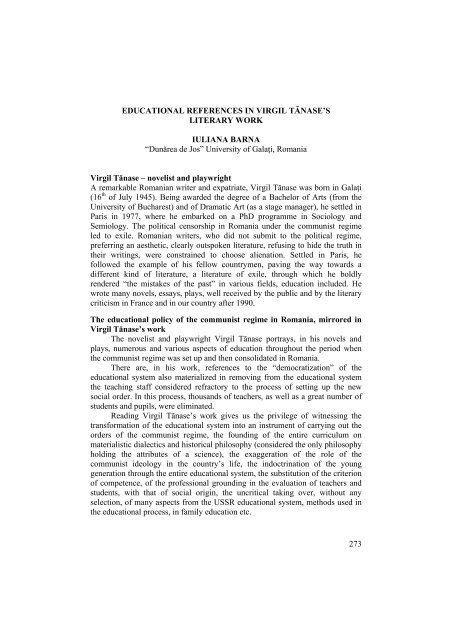culture, subculture and counterculture - Facultatea de Litere
culture, subculture and counterculture - Facultatea de Litere
culture, subculture and counterculture - Facultatea de Litere
You also want an ePaper? Increase the reach of your titles
YUMPU automatically turns print PDFs into web optimized ePapers that Google loves.
EDUCATIONAL REFERENCES IN VIRGIL TĂNASE’S<br />
LITERARY WORK<br />
IULIANA BARNA<br />
“Dunărea <strong>de</strong> Jos” University of Galaţi, Romania<br />
Virgil Tănase – novelist <strong>and</strong> playwright<br />
A remarkable Romanian writer <strong>and</strong> expatriate, Virgil Tănase was born in Galaţi<br />
(16 th of July 1945). Being awar<strong>de</strong>d the <strong>de</strong>gree of a Bachelor of Arts (from the<br />
University of Bucharest) <strong>and</strong> of Dramatic Art (as a stage manager), he settled in<br />
Paris in 1977, where he embarked on a PhD programme in Sociology <strong>and</strong><br />
Semiology. The political censorship in Romania un<strong>de</strong>r the communist regime<br />
led to exile. Romanian writers, who did not submit to the political regime,<br />
preferring an aesthetic, clearly outspoken literature, refusing to hi<strong>de</strong> the truth in<br />
their writings, were constrained to choose alienation. Settled in Paris, he<br />
followed the example of his fellow countrymen, paving the way towards a<br />
different kind of literature, a literature of exile, through which he boldly<br />
ren<strong>de</strong>red “the mistakes of the past” in various fields, education inclu<strong>de</strong>d. He<br />
wrote many novels, essays, plays, well received by the public <strong>and</strong> by the literary<br />
criticism in France <strong>and</strong> in our country after 1990.<br />
The educational policy of the communist regime in Romania, mirrored in<br />
Virgil Tănase’s work<br />
The novelist <strong>and</strong> playwright Virgil Tănase portrays, in his novels <strong>and</strong><br />
plays, numerous <strong>and</strong> various aspects of education throughout the period when<br />
the communist regime was set up <strong>and</strong> then consolidated in Romania.<br />
There are, in his work, references to the “<strong>de</strong>mocratization” of the<br />
educational system also materialized in removing from the educational system<br />
the teaching staff consi<strong>de</strong>red refractory to the process of setting up the new<br />
social or<strong>de</strong>r. In this process, thous<strong>and</strong>s of teachers, as well as a great number of<br />
stu<strong>de</strong>nts <strong>and</strong> pupils, were eliminated.<br />
Reading Virgil Tănase’s work gives us the privilege of witnessing the<br />
transformation of the educational system into an instrument of carrying out the<br />
or<strong>de</strong>rs of the communist regime, the founding of the entire curriculum on<br />
materialistic dialectics <strong>and</strong> historical philosophy (consi<strong>de</strong>red the only philosophy<br />
holding the attributes of a science), the exaggeration of the role of the<br />
communist i<strong>de</strong>ology in the country’s life, the indoctrination of the young<br />
generation through the entire educational system, the substitution of the criterion<br />
of competence, of the professional grounding in the evaluation of teachers <strong>and</strong><br />
stu<strong>de</strong>nts, with that of social origin, the uncritical taking over, without any<br />
selection, of many aspects from the USSR educational system, methods used in<br />
the educational process, in family education etc.<br />
273












